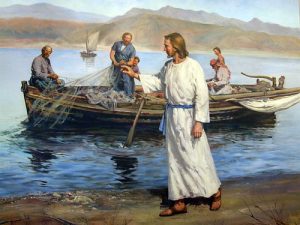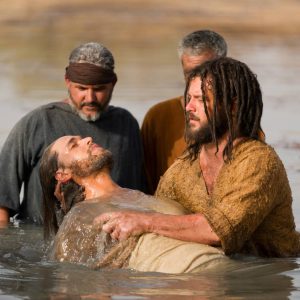 “Jesus took Peter, James and his brother John off by themselves and led them up a high mountain.”
“Jesus took Peter, James and his brother John off by themselves and led them up a high mountain.”
The Transfiguration story in Mark’s gospel appears just after Jesus has reminded the disciples: you who desire to save your life, must lose it. Whoever loses your life for My sake, and the gospel – you will save your life. And, says Jesus, I will not be ashamed of you when I come into the glory of my Father. Then Jesus lets these remarks take root for six days before he sets off up the mountain with Peter, James and John.
Here Jesus is transfigured, glorified by God. Is He telling Peter, James and John that He is not ashamed of them: Peter who will later deny even knowing Him, James and John, the Sons of Thunder, whose mama requested preferential seating for them in heaven? They climbed the mountain with Jesus and witnessed His glory.
The story (I believe) calls each one of us to examine what mountain we must climb to see God’s glory. We can apply the story to death or a near-death experience. But, if we do that we miss the everyday mountains we must climb. Call those mountains what you will, we must climb them to witness God’s glory: hurdles, challenges, enticing temptations, near occasions of sin, quirks of personality, Lenten resolutions, pet peeves…. Some days they are like a little pebble on our path, which we glibly kick aside. Or, they can be like a grain of sand inside your shoe – no bother when you are sitting still but the instant you start to move it quickly makes itself felt. Other days, they are like boulders we can’t move with a backhoe. Everyone’s mountain is different. But, to witness God’s glory, we must climb our “mountains”.
Once on the mountaintop, we must have eyes to see God’s glory. We must stay alert, have the insight to know that we are at the top. Our cooperation with God’s grace has brought us to a mountaintop. The disciples could have missed Jesus’ transfiguration if they:
- had been too busy taking in the view
- were gloating over their status or talking about those left behind
- were wondering about what was on the agenda for tomorrow
- were wondering how long were they going to be up on this mountain anyway
- were wondering if there would be time to finish what they had started when Jesus summoned them
- were bickering over who was going to get use the walking stick going down the mountain
- were asking themselves who provided the fish for supper last night and whose turn is it now?
You fill in the blanks…you know what it is that keeps you from seeing God’s glory. Theses are the things that cause you to miss the “small miracles”, the “everyday transfigurations” in yourself, in one another, in nature. And, gently remind yourself, that Jesus and the disciples also went back down the mountain. We need to thank God when we get to the top. But we can hardly stay there. There are more mountains to climb. While you are at the top, if only for an instant, witness the transfiguration.
Jesus did not become “more God” that day on the mountain. I don’t think the change was so much in Jesus, as it was in the disciples. They were ready. They had climbed the mountain. And their eyes were open to witness the miracle of the moment. Miracles (transfigurations) are all around us IF we but have the eyes to see
- the miracle of God’s graciousness when a person holds a door open for another
- the miracle of God’s mercy when a mistake is not challenged
- the miracle of God’s steadfastness when day after day we gather for communal exercises
- the miracle of God’s humility when reconciliation occurs
- the miracle of God’s humor when it rains on our picnics
- the miracle of God’s artistry in the beauty of nature that surrounds us.
You can make your own litany of miracles. God is already there, is here. Jesus invites us up the mountain and leads the way. We must open our eyes to witness the transfiguration.
~Reflection by Sister Roberta Bailey, OSB
Gospel: Matthew 17:1-9
Continue Reading






